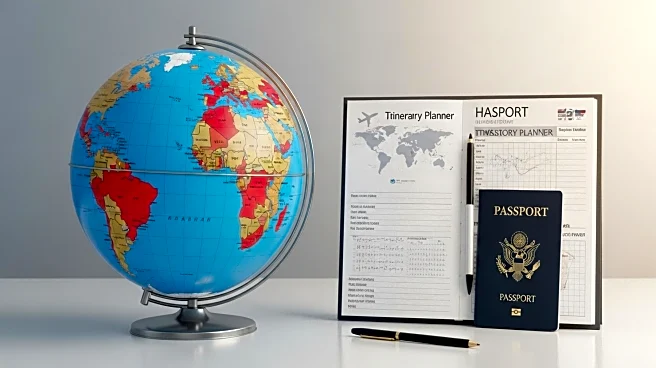What's Happening?
Recent research conducted by SimCorner, an eSIM and travel SIM provider, indicates that geopolitical tensions are influencing travel decisions among U.S. travelers. The survey, which included 1,219 respondents, found that two in five travelers are reconsidering their holiday plans, with a notable shift from North America to Europe. Specifically, 31% of respondents have altered their plans from North America to Europe, with the percentage of travelers intending to visit North America dropping from 25% in 2024 to 17% in 2025. Conversely, Europe has seen an increase in interest, rising from 46% to 51% over the same period. Older travelers, particularly those aged 65 and over, are more likely to cancel or avoid certain regions, with 29% expressing such intentions compared to 15% of younger travelers under 26. The findings underscore the importance of safety, security, and connectivity for travelers, as emphasized by Shehbaz Shaikh, CEO and co-founder of SimCorner.
Why It's Important?
The shift in travel preferences due to geopolitical tensions has significant implications for the U.S. travel industry. As travelers prioritize safety and security, destinations perceived as stable and secure, such as Europe, are likely to benefit from increased tourism. This trend could impact U.S. travel agencies and businesses that rely on inbound tourism, potentially leading to a decrease in revenue from international visitors. Additionally, the focus on connectivity and reliable travel experiences highlights the need for travel companies to adapt their offerings to meet changing consumer demands. The data from SimCorner suggests that travel companies may need to reassess their strategies and focus on providing secure and reliable travel options to attract and retain customers.
What's Next?
Travel companies and agencies may need to adjust their marketing strategies and offerings to align with the changing preferences of travelers. This could involve promoting destinations that are perceived as safe and secure, as well as enhancing connectivity and travel experiences. Additionally, the industry may see increased collaboration with technology providers to offer seamless and reliable travel solutions. As geopolitical tensions continue to influence travel decisions, companies will need to remain agile and responsive to shifts in consumer behavior to maintain competitiveness in the market.










